EU Approves Plan to Use Frozen Russian Assets for Ukraine
EU nations agree to a plan that would use profits from frozen Russian assets to help rebuild Ukraine, a step towards addressing the nation's urgent needs.

Photograph: Valentyn Ogirenko/Reuters
Brussels, Jan 30 (AP) European Union nations have decided to approve an outline deal that would keep in reserve the profits from hundreds of billions of dollars in Russian central bank assets that have been frozen in retaliation for Moscow's war in Ukraine, an EU official said.
The tentative agreement, reached late on Monday, still needs formal approval but is seen as a first step toward using some of the 200 billion euros (USD 216 billion) in Russian central bank assets in the EU to help Ukraine rebuild from Russian destruction.
The official, who asked not to be identified since the agreement was not yet legally ratified, said the bloc would allow to start collecting the extraordinary revenues generated from the frozen assets ... to support the reconstruction of Ukraine.
How the proceeds will be used will be decided later, as the issue remains mired in legal and practical considerations.
There is urgency since Ukraine is struggling to make ends meet, and aid plans in the EU and the United States are being held back over political considerations including whether allies will continue helping Ukraine at the same pace as they did in the first two years of the war.
EU leaders will meet on Thursday hoping to approve a 50-billion-euro (USD 54 billion) support package for Ukraine over the solitary opposition of Hungarian Prime Minister Viktor Orban.
Even if using the unfrozen assets, which now go untapped, seems like a practical step to take, many fear that financial weaponisation could harm the standing of the EU in global financial markets.
Early this month, Ukrainian President Volodymyr Zelenskyy called for a strong decision this year for the frozen assets in Western banks to be directed towards defence against the Russian war and for reconstruction of Ukraine.
The EU step late Monday paves the way if EU nations ever want to impose such measures. Group of Seven allies of Ukraine are still looking for an adequate legal framework to pursue the plan.
The US announced at the start of Russia's invasion that America and its allies had blocked access to more than USD 600 billion that Russia held outside its borders including roughly USD 300 billion in funds belonging to Russia's central bank. Since then, the US and its allies have continued to impose rounds of targeted sanctions against companies and wealthy elites with ties to Russian President Vladimir Putin.
The World Bank's latest damage assessment of Ukraine, released in March 2023, estimates that costs for the nation's reconstruction and recovery will be USD 411 billion over the next 10 years, which includes needs for public and private funds.
Belgium, which holds the rotating presidency of the European Union for the next six months, is now leading the talks on whether to seize Russia's assets. Belgium is also the country where most frozen Russian assets under sanctions are being held.
The country is collecting taxes on the assets. Belgian Prime Minister Alexander De Croo said in October that 1.7 billion euros (USD 1.8 billion) in tax collections were already available and that the money would be used to pay for military equipment, humanitarian aid and helping rebuild the war-torn country.
The tentative agreement, reached late on Monday, still needs formal approval but is seen as a first step toward using some of the 200 billion euros (USD 216 billion) in Russian central bank assets in the EU to help Ukraine rebuild from Russian destruction.
The official, who asked not to be identified since the agreement was not yet legally ratified, said the bloc would allow to start collecting the extraordinary revenues generated from the frozen assets ... to support the reconstruction of Ukraine.
How the proceeds will be used will be decided later, as the issue remains mired in legal and practical considerations.
There is urgency since Ukraine is struggling to make ends meet, and aid plans in the EU and the United States are being held back over political considerations including whether allies will continue helping Ukraine at the same pace as they did in the first two years of the war.
EU leaders will meet on Thursday hoping to approve a 50-billion-euro (USD 54 billion) support package for Ukraine over the solitary opposition of Hungarian Prime Minister Viktor Orban.
Even if using the unfrozen assets, which now go untapped, seems like a practical step to take, many fear that financial weaponisation could harm the standing of the EU in global financial markets.
Early this month, Ukrainian President Volodymyr Zelenskyy called for a strong decision this year for the frozen assets in Western banks to be directed towards defence against the Russian war and for reconstruction of Ukraine.
The EU step late Monday paves the way if EU nations ever want to impose such measures. Group of Seven allies of Ukraine are still looking for an adequate legal framework to pursue the plan.
The US announced at the start of Russia's invasion that America and its allies had blocked access to more than USD 600 billion that Russia held outside its borders including roughly USD 300 billion in funds belonging to Russia's central bank. Since then, the US and its allies have continued to impose rounds of targeted sanctions against companies and wealthy elites with ties to Russian President Vladimir Putin.
The World Bank's latest damage assessment of Ukraine, released in March 2023, estimates that costs for the nation's reconstruction and recovery will be USD 411 billion over the next 10 years, which includes needs for public and private funds.
Belgium, which holds the rotating presidency of the European Union for the next six months, is now leading the talks on whether to seize Russia's assets. Belgium is also the country where most frozen Russian assets under sanctions are being held.
The country is collecting taxes on the assets. Belgian Prime Minister Alexander De Croo said in October that 1.7 billion euros (USD 1.8 billion) in tax collections were already available and that the money would be used to pay for military equipment, humanitarian aid and helping rebuild the war-torn country.
You May Like To Read
TODAY'S MOST TRADED COMPANIES
- Company Name
- Price
- Volume
- Vodafone-Idea-L
- 11.55 ( -0.86)
- 54951393
- AvanceTechnologies
- 1.16 (+ 4.50)
- 30451782
- Mehai-Technology
- 1.65 ( -4.62)
- 27788127
- Sunshine-Capital
- 0.27 ( 0.00)
- 20413852
- Harshil-Agrotech
- 0.59 ( -3.28)
- 18624052





